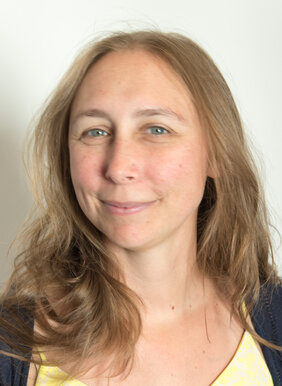Heidelberg astrophysicist Dr Kathryn Kreckel is receiving an ERC Starting Grant for excellent young researchers from the European Research Council (ERC). The five-year grant will cover a project in which the researcher will investigate the physics of metal enrichment in the Interstellar Medium (ISM). The ERC funding totals approx. 1.5 million euros. Since October 2019, Dr Kreckel is leading an Emmy Noether Group at the Astronomisches Rechen-Institute (ARI) at the Centre for Astronomy of Heidelberg University (ZAH). The ERC project is scheduled to start in October 2023.
The “ISM-METALS” project that has now been funded by the European Research Council will focus on refining our ability to measure chemical elements in the interstellar medium, and use this to further our understanding of galaxy evolution. At the birth of our universe, the Big Bang produced mainly hydrogen and helium. With the life and death of stars, heavier elements (metals) are produced, and enrich the surrounding interstellar medium (ISM) by introducing elements like carbon, oxygen, nitrogen and sulphur. These elements are critical to enable future generations of star formation as they set the heating and cooling balance in star-forming regions, and establish the carbon chemistry that is necessary for life on our planet. Simultaneously, as these elements are mainly only created over time, measuring their abundance serves as a cosmic clock. However, long-standing uncertainties plague our ability to measure these metal abundances. Dr Kreckel and her team will use new optical spectra of thousands of star-forming regions in our own Milky Way and Local Group galaxies (SDSS-V/LVM; www.sdss5.org/mappers/local-volume-mapper/) and more distant Local Volume galaxies (PHANGS-MUSE; sites.google.com/view/phangs/home) to develop new techniques and achieve high precision metallicity measurements. This will allow us to accurately judge how metals build up over cosmic time with high redshift JWST spectroscopy, and precisely determine the magnitude of variations due to individual star-forming and gas accretion events, enormously improving our understanding of the relative importance of those mechanisms for galaxy evolution. "This is a great opportunity for expanding our knowledge on the chemical evolution of our own Milky Way Galaxy, and galaxies across the universe,“ Dr. Kreckel comments.
Funding from the ERC Grant expands the work of Dr Kreckels Emmy Noether Group into a new research direction, which already has funding of 1.7 million euros from the German Research Foundation (DFG).
Since 2011 Dr Kreckel has been a postdoc at MPIA, using optical integral field spectroscopy to study nearby (D<20 Mpc) galaxies. Her work has covered a broad range of topics around the theme of ISM physics, with key results in the area of starburst driven winds, cold dust in the ISM, and star formation. In her use of different IFS instruments combined with multi-wavelength data, she has led end-to-end projects that combine raw data and photoionization models to extract physical conditions for different processes affecting the ionized gas.
Her most recent work was carried out within the PHANGS collaboration which is observing galaxies with ALMA, the VLT/MUSE, and HST in order to understand the interplay of the small-scale physics (about 50 to 100pc) of gas and star formation with galactic structure and galaxy evolution. Finally, she currently acts as Survey Scientist for the Local Volume Mapper, a project within SDSS-V that will carry out an IFS survey of the Milky Way and Local Group galaxies to directly probe physical scales below 20 pc from which the global correlations arise, and witness the physics of galaxy formation at the “energy injection scale”.
The European Research Council awards the Starting Grant to outstanding young researchers. Funding is awarded based on their scientific excellence and the innovative potential of their research ideas.
FURTHER INFORMATION
Press release by the European Research Council
Press release of Heidelberg University
Homepage of Dr Kathryn Kreckel
LOCAL CONTACT
Scientific contact
Dr Kathryn Kreckel
Center for Astronomy at Heidelberg University (ZAH)
Astronomisches Rechen-Institut (ARI)
kathryn.kreckel(at)uni-heidelberg.de
Contact for the Media
Dr Guido Thimm
Center for Astronomy at Heidelberg University (ZAH)
thimm@uni-heidelberg.de

